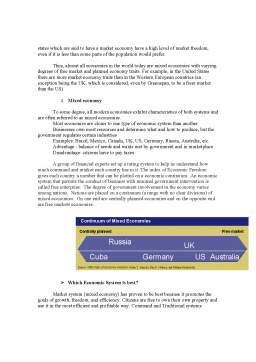Extras din referat
-Context in society
An economic system can be considered a part of the social system and hierarchically equal to the law system, political system, cultural, etc. There is often a strong correlation between certain ideologies, political systems and certain economic systems (for example, the meanings of the term "communism"). Many economic systems overlap each other in various areas (for example, the term "mixed economy" can be argued to include elements from various systems). There are also various mutually exclusive hierarchical categorizations.
-What is an economic system?
The basic definition would be the way that the world is run through financial means. This could be expanded upon by stating that is the way for which money is earned and used in the world.
An economic system describes how a country’s economy is organized.
Because of the problem of scarcity, every country needs a system to determine how to use its productive resources.
All economic systems try to answer the three basic economic questions
1) What to produce?
2)How to produce?
3) For whom to produce?
An economic system is a way of answering these basic questions, and different economic systems answer them differently. Many different objectives may be seen as desirable for an economy, like efficiency, growth, liberty, and equality.
Economic systems can be divided by the way they allocate economic inputs (the means of production) and how they make decisions regarding the use of inputs in four types.
-TYPES OF ECONOMIC SYSTEMS:
1. Traditional Economy
Traditional Economy is a system where the allocation of available resources is made on the basis of inheritance. Traditional Economy generally makes use of prehistoric instruments and techniques, an economic system in which economic decisions are based on customs and beliefs
People will make what they always made and will do the same work their parents did. Exchange of goods is done through bartering: trading without using money
Basic economic questions are answered by ritual, habit, and custom
From time immemorial, conventional and age-old human occupations like agriculture remained the focal point of interest for Traditional Economy. This is perhaps the only economic theory, which has evolved historically in certain countries. However, all nations having Traditional Economy these days, are fast switching off to more contemporary concepts like Mixed Economy, Command Economy or Market Economy, to keep pace with the modern economic trends and happenings.
Irrespective of the old approaches of Traditional Economy, the concept is still prevalent in some under-developed South American nations like Papa New Guinea and Brazil, and in some African and Asian countries.
In fact, Traditional Economy can be called as the economy of the ingenious population of the world like the Pygmies belonging to the Congo region in Central Africa.
The Inuit people of Canada provide an example of a traditional economy. For thousands of years, Inuit parents have taught their children the survival skills needed to survive in the Arctic Circle's severe climate.
As per a World Bank estimate, this type of economy is still prevalent among 400 million indigenous people across the world. So, it is not at all an extinct economic concept in present times.
There are of course a handful of benefits derived from Traditional Economy. It actually nurtures a feeling of unity among individuals, helping in the development of a social bond and sense within them by reducing mutual hostilities. Consequently, people feel psychologically more free, comfortable and secured, which increase their working abilities million fold. This in turn, brings down the rate of unemployment. Moreover, since the entire population is engaged in activities of some kind or the other, their mind never sit idle to plan criminal activities. Hence, there is a significant decrease in the rates of crime as well. To sum up, Traditional Economy permits people to enjoy more independence against minimum or no financial expenses.
Disadvantages: Technology is not used, difficult to improve , lack of progress, lowers standard of living.
2. Planned economy
Planned economy is a type of economy that gives the government total control over the allocation of resources. A planned economy alleviates the use of private enterprises and allows the government to determine everything from distribution to pricing. Planned economies basically give the government dictatorship type control over the resources of the country. Planned economies can provide stability, but also can limit the growth and advancement of the country if the government does not allocate resources to the innovative enterprises
Basic economic questions are answered by the government (central authority)
Government makes all economic decisions and owns most of the property.
Governmental planning groups determine such things as the prices of goods/services and the wages of workers.
Preview document
Conținut arhivă zip
- Economic Systems.doc





















